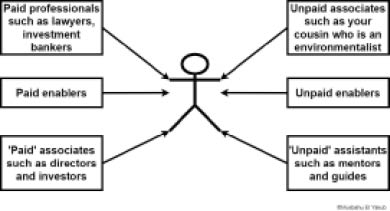Last week, we brought out the reality that people leave paid employment for several reasons. Even for those among them that may have reached ‘retirement age’, they may still have several years of productive life ahead of them. We mentioned that these people come reasonably prepared and with a DNA of some three-and-a-half decades of success under their belt that can be put positively to their personal, community, and national use. However, they will need to change certain components of their mindsets, reshape and resharpen their skills in some specific ways if they are to enhance their chances of success in entrepreneurship.
Today, we will continue with specific actions that this group of aspiring entrepreneurs will need to think through and act on.
Build your ‘tribe’ of experienced and credible professionals and associates: The employee mindset can help but also hurt you if you are going into business. To keep your feet to the ground and remain real, you will need to engage professionals and associates along the way. The criteria for this engagement are three, viz, competence, credibility and track record. On one hand you need the professionals that are competent in what they technically do, who have ‘been there and done that’, and will draw on their knowledge, experience and network of relationships to guide, advise and support you. On the other hand, you need credible professionals that are also trustworthy.
Surround yourself with a ‘supportive tribe’. Your ‘supportive tribe’ has nothing to do with people of your ethnic stock but people from diverse backgrounds and experiences that are available, on paid and unpaid basis, to support you. Some of these professionals and associates are individuals and organisations that may be paid directly or benefit in some other ways from you and your activities. Some other professionals and associates may not necessarily be paid but are interested in your success. Regardless of whether individuals and organisations are paid or not, I think it is appropriate and fair that you make them benefit in some way. How you can make them benefit will depend on who they are and the dynamics of your relationship with them. But it is generally required for the sustainability of their support.
Engaging professionals and associates does not, however, relieve you of personal responsibility of checking and cross-checking whatever they may suggest to you. Be involved in any studies that they may conduct for you. You will need to understand what may be decided and be comfortable with it. As you work with professionals and associates, you have to be voracious in learning and asking questions. A few of the groups that make up your support tribe could be as shown below:
 musbahu el Yakub
musbahu el Yakub
Discipline: In discussing mindset changes last week, we mentioned the support that paid employees, especially at senior levels, get from the organisations that employed them. The conducive work environment provided as well as other benefits and privileges cost their organisations substantial sums. Unfortunately, many employees take all these for granted only to realise when it may be late that their private businesses might not be able to support the working lifestyles that their employers provided them with in the past.
The panacea to this is to be brutally honest about what you can and cannot afford. A realistic cost assessment has to be made to bring out the true financial costs of what your business should and should not bear. Can you afford the fuel costs on a twenty-four basis for your standby office generator? Can you afford an official vehicle for each of your directors and other senior officials? Must you have a tea boy and a dispatch rider? The truth is that most of the large and highly successful businesses you see today, local and international, started out without the perks and benefits you may be considering for yourself and your staff at the start of your operations. The point is that you have to be sincere with yourself and do what the business can bear and not necessarily what you want to have. It will take time, effort, and a bit of luck to get to your dreamland. In fact, even if you can afford those perks, it is good to start-off moderately. Discipline is key.
Focus: One of the mistakes many people make going into business is to put their hands in many pies. This is usually on the grounds that they want to ‘diversify’ their sources of income and cash flow, as well as reduce business risks. But this ‘diversification’ may be reasonable only within limits. The truth is that each business you go into, no matter how ‘small’ it might seem, will require some gestation period; it will take your time, attention, effort and some resources. Each business will force you through a learning process to give you requisite experience that will make it possible for you to understand it well to the point that you can begin to address likely issues even before they rear their heads and ultimately to success.
If you thin yourself and your resources out through over-diversification, each business will suffer, and you will lose out. Sometimes, it is wise to put all your eggs in one basket, or only two, and watch over them closely and seriously. Focus is important to business success. First it forces you to go through a selection process of choosing the best from a pool of options. This deepens your understanding of the business and attracts more of your interest and resolve. And then it enhances your overall efficiency and effectiveness in getting things done.
Cut your costs down! Specific aspect of discipline and focus is that anyone starting off in business should be excellent at cutting their costs down. You need to get the most mileage for each Naira and Dollar you may be spending. Even if you have ‘unlimited’ funds available for what you want to do, business discipline requires that you eliminate wastes in capital and operational costs to be able to create the most value possible and remain competitive.
A smart thing to always do is to try to make capital investments only to the extent of your requirements (taking possible growth into consideration) and minimise fixed costs by making as much of it as is practically possible. The point is that your resources should be channelled into the assets and activities that will directly generate revenue and earn income for you at minimum costs and within the shortest period possible. People leaving paid employment and going into business find this generally difficult because they have come to believe that those ‘overheads’ are a right for them! But high overheads will reduce profitability, exert extra pressure on funding requirements and can ultimately bankrupt a business.
We will conclude this series next week by taking up a few more specific factors to be considered by people leaving paid employment and going into business.

 Join Daily Trust WhatsApp Community For Quick Access To News and Happenings Around You.
Join Daily Trust WhatsApp Community For Quick Access To News and Happenings Around You.


